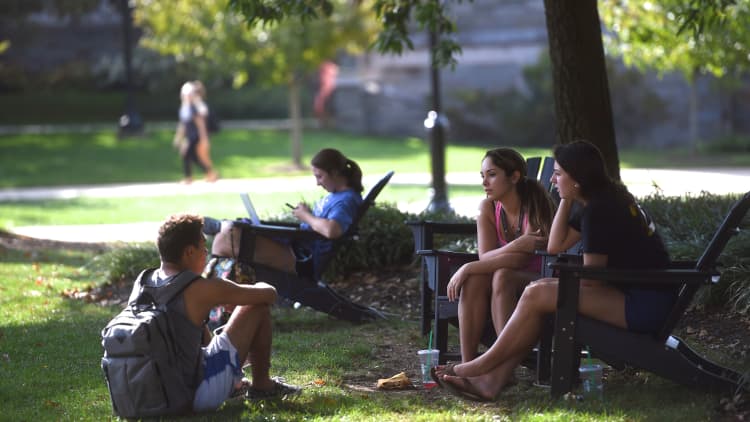It's a pretty common question heard from college students who work during school or over the summer: "Will my income affect my eligibility for scholarships or aid?"
For most students, the answer is no.
The Free Application for Federal Student Aid, or FAFSA, the form that colleges and universities use to determine a student's need for financial aid, has protections in place for student earnings. For the 2018-19 school year, the amount a student can earn before it is counted as income is $6,570.
To make more than that, a student would have to work more than 17 hours a week for 52 weeks a year, assuming they made the federal minimum wage of $7.25.
"For most dependent undergraduate students, what they're going to earn for their summer job is a few thousand dollars so it won't be an issue," said Kathy Ruby, director of college finance at CollegeCoach.
Even after that amount, money earned might not have an effect on financial aid, said MorraLee Keller, the director of technical assistance at the National College Access Network.
"There are other nuances in the formula," Keller said. "There's no clear blanket statement."

In addition to the income allowance, there are other rules in place that help students who may be worried about their earnings having a negative impact on their financial aid.
Work study
Income from any federal work-study job is not counted in yearly income on the FAFSA, and can help balance out earnings from a job off campus.
"If you're getting close to the limit, it would behoove you to have a work-study job even if it pays less," said Kalman A. Chany, author of "Paying for College Without Going Broke."
In addition to extra spending money, a work-study job can add valuable skills and experience to a student's resume. And, because work-study jobs are only open to students, they are generally more flexible than jobs off campus.
Blaine Blontz, the founder of Financial Aid Coach, got his start as a work-study student in a financial aid office.
"It proved to be a valuable experience," Blontz said.
If students are making some of their yearly income from a work-study job but are not sure that it's counted correctly on their FAFSA, they should check with their college's office of financial aid right away.
More from Personal Finance:
Attending Harvard will cost $475,000 in 2036. Here's how much other schools will charge
This account can help you slash your tuition bill — and few Americans know it
Tapping 529s to pay for private school could come back to bite you
The base years
The FAFSA has changed the years that students and parents report to receive financial aid. Now, instead of the prior year, they use the "prior, prior" year, meaning that for the school year 2018-19, the reported financial information is from 2016.
What this means for students is that their income from 10th grade through the sophomore year of college will be reported on the FAFSA, assuming they graduate in four years and don't take a gap year.
After that, their income will not be filed to determine financial aid.
"If the child has already finished their sophomore year and they only have two more years to go, they can make whatever they want," author Chany said.
What income can affect your aid
It is possible that student income could have a negative effect on financial aid, but only in very specific circumstances. For students who are eligible to receive need-based aid through scholarships and grants, having a substantial student income could limit their eligibility for that money.
"If you have need-based financial aid eligibility, you'd want to check with your financial aid office to see if it will affect any of the 'good money' you could receive," CollegeCoach's Ruby said. "Especially if you're eligible for a federal or state grant."
Ask your financial aid office
If you are concerned about your student income, it's best to ask your college or university's financial aid office for help, experts say.
Colleges handle financial aid differently. While most colleges take the FAFSA, some also require the College Scholarship Service, or CSS profile, another form required to determine eligibility for non-government financial aid such as grants, scholarships and loans from the college.
The CSS Profile requires much more financial information than the FAFSA.
Ruby urges students to find out how working and earning income will impact their financial aid. "Most financial aid offices would be happy to talk about that with you," Ruby said. "Remember, they're there to help."


